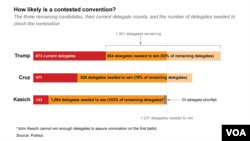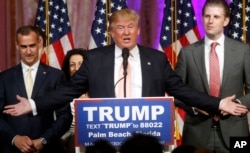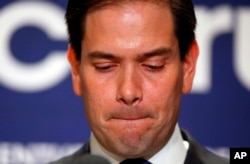Donald Trump is the current front-runner for the Republican presidential nomination; but, with more than half of the nominating contests already completed, he may not have enough time left to secure that all-important number of delegates needed to win the party’s nomination outright: 1,237.
Why is 1,237 such an important number?
Candidates don’t secure the nomination by winning state by state votes — they win by securing enough delegates who will vote for them at their party’s convention.
Larry Sabato, the director of the Center of Politics at the University of Virginia, said Trump's chances "are good but not certain." There are about 1,061 delegates still to be awarded. Trump would have to win almost 60 percent of those delegates to secure the nomination.
The two remaining candidates in the field — Texas Senator Ted Cruz and Ohio Governor John Kasich — have even fewer numbers of delegates so their chances of winning the nomination are even smaller.
“Mathematically at this point, only two of the candidates have the chance to amass the 1,237 that are necessary to win on a first ballot at the convention - and that’s Ted Cruz and Donald Trump,” said Craig Sautter, a DePaul University professor who has written several books about presidential conventions.
What happens if Donald Trump is close to having 1,237 delegates?
It’s very hard to predict what will happen. In previous presidential elections, candidates have always won the nomination outright; but, in this year’s divided field, said Sautter, “it could be very messy.”
If Trump is very close to having 1,237 delegates, Sabato said it’s “technically possible” to deny him the nomination but it would have very serious consequences for the survival of the Republican Party.
Trump has threatened to run as a third-party candidate if he feels he is not treated fairly by Republicans and said there would be “riots” if the people who voted for him are not represented at the convention.
What happens if Trump doesn’t end up close to 1,237 delegates?
This is what candidates Cruz and Kasich are hoping will happen. It’s a big reason they are both still in the race even though they have smaller numbers of delegates.
“The Republican leadership — both elected and appointed — and the candidates and their delegates, will swing into action and at that point, it will be difficult for Trump to succeed,” said Sabato.
That battle could lead all the way to Cleveland in July when the Republican Party and all of the delegates for each candidate meet to select their nominee for the general election.
Sabato said Cruz and Kasich are thinking, “If it’s not Trump, then why not me?”
Who are the delegates? Do they have to stick with their candidate at the convention – or could they move over to Cruz or Kasich?
Delegates are a mix of party activists, state and local politicians and sometimes even representatives of the candidates themselves.
They have to vote for the candidate they have pledged to support during the first round of voting, called the “first ballot” at the convention.
If no candidate has 1,237 delegates pledged to vote for him, the delegates will have to hold another round of voting and that’s when they’re allowed to vote for any candidate. This is called a contested convention.
What happens next in a contested convention?
A contested convention is very unusual - the last time it happened to the Republicans was in 1948.
After the “first ballot,” the delegates are “unbound,” meaning they can vote for whomever they want in the next rounds of voting. The voting goes as many times as needed until a candidate has 1,237 delegates.
Sautter thinks there may be several rounds of voting because “delegates are loyal to the candidates themselves.” Some delegates may wait for a candidate to quit and support another candidate before changing their vote.
Or, candidates will have to find a way to make deals with each other to combine delegates and get to that all-important number of 1,237.
“I think it’s going to be Cruz or Trump who makes a deal with Kasich to pile up their delegates together,” said Sautter.
Are there other possible deals?
Yes — don’t forget the delegates who were pledged to Florida Senator Marco Rubio — the candidate who dropped out after voting on March 15.
Sautter thinks Trump could look to “pick off a few of those. So if he’s very close, I’m sure he could convince a few of those people with enticements.”
He also said Kasich has a longer-term strategy “that after several ballots, people will begin to ask themselves who is the best candidate today to put up against Hillary Clinton.”
In short, a contested convention would be very unpredictable.
What happens between now and the convention in July?
There are still many primary contests that could bring Trump close to the numbers he needs. California has the last vote of the primary contest season on June 7. Its 172 delegates could be very important in tipping the balance.
Then, said Sabato, there is another important number: 40.
That’s the number of days between the last vote in California and the beginning of the convention. The candidates may look to make deals with each other to avoid a messy, unpredictable fight at the convention.
Said Sabato, “They’ll have 40 days to iron this out before disaster befalls them.”







